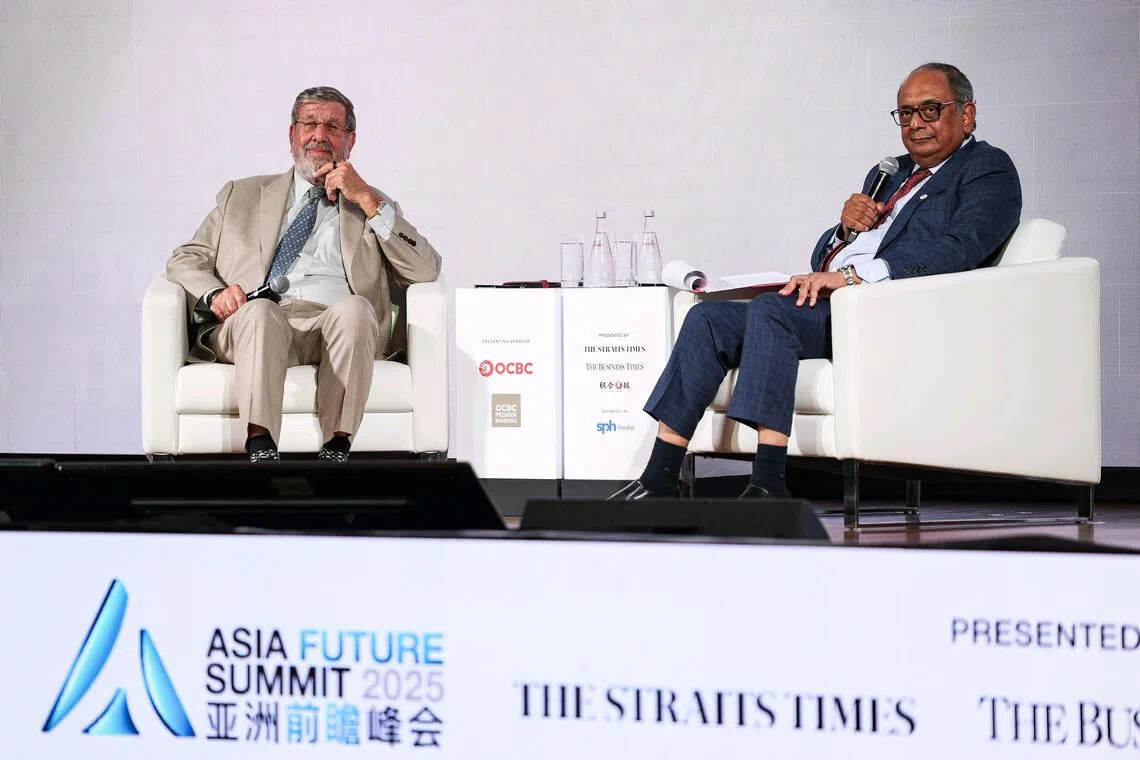Asia Future Summit 2025
Thai hospitality giant Minor International stays on growth track despite uncertainties: Founder
Sign up now: Get ST's newsletters delivered to your inbox

Founder and chairman of Minor International William Heinecke (left) kicked off the two-day Asia Future Summit with a discussion moderated by ST senior columnist Ravi Velloor (right).
ST PHOTO: BRIAN TEO
Follow topic:
SINGAPORE – In the six decades that US-born entrepreneur William Heinecke has lived in Thailand, the kingdom has weathered political uncertainty and economic shocks.
Yet, he never wavered, keeping the company he founded before he turned 18 on an investment momentum that only continues to pick up.
“That is not the case with all foreign investors that are looking at Thailand because they see uncertainty and instability, which doesn’t bode well for investments, and certainly (not if) security is in question,” said the naturalised Thai citizen.
Despite the current climate, he holds faith that given time, South-east Asia’s second-largest economy will recover its leading position within Asean.
Mr Heinecke, the founder and chairman of Thailand-listed hospitality and leisure giant Minor International, was speaking on Oct 8 at the Asia Future Summit
OCBC is the presenting sponsor of the conference.
Held at The Ritz-Carlton, Millenia Singapore, the premier thought leadership conference returned for its fourth edition this year with the theme, Navigating a Fractured World.
Mr Heinecke kicked off the two-day event with an opening conversation on doing business in the current landscape.
The 40-minute discussion was moderated by ST senior columnist Ravi Velloor.
Despite Thailand’s economic and political swings, Minor International never slowed its investment programme. Instead, its pace has only accelerated, said the 76-year-old businessman.
The group’s hospitality portfolio currently spans more than 640 hotels, resorts and branded residences with over 90,000 rooms. Its food service and restaurant arm boasts more than 2,600 outlets worldwide.
As one of the largest employers in Thailand, the group has over 90,000 staff on its payroll.
“I am totally committed to Thailand,” added Mr Heinecke, who moved to Bangkok with his family when he was 14.
“I gave up my US citizenship long before it was popular… My children are Thai, my grandchildren are Thai, and my great-grandchildren are Thai,” he said.
“It certainly demonstrated to my Thai friends and partners that we are committed. We weren’t going anywhere.”
Minor International’s focus is firmly on Asia, he stressed.
He noted that its first Avani-branded properties are being developed in India and Singapore. Set to open in the second quarter of 2027, its 14-storey lifestyle hotel in Singapore is being built in the Tanjong Pagar district.
The group continues to grow its footprint in many other countries, such as Japan and Indonesia.
Central to Minor International’s success are its people, evident in how education remains the biggest investment the group makes both in its charities and as a company, said Mr Heinecke.

Asked whether Thailand has an education system fit for purpose, he noted that it has improved greatly. But he said that more emphasis on it is needed, as he believes it could make a big difference to the kingdom.
As part of efforts to address issues related to talent shortages, Minor Hotels founded the Asian Institute of Hospitality Management in 2021 with Les Roches, Switzerland’s top hospitality school.
As for the extent to which artificial intelligence (AI) is disrupting the hospitality business, Mr Heinecke believes that it will not replace the human touch.
“When I arrive at a hotel tired from an exhausting trip, the last thing I want to hear is a machine (greeting me),” he said. “The personal touch in our business is always going to be there.”
The way he sees it, digitalisation and the use of AI will help create better people and team members for the hospitality industry.
“Don’t be afraid that it is going to replace people,” he said. THE BUSINESS TIMES

